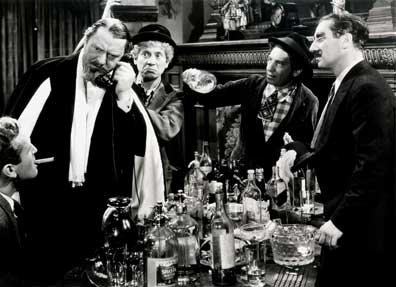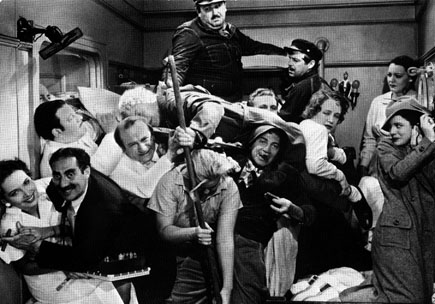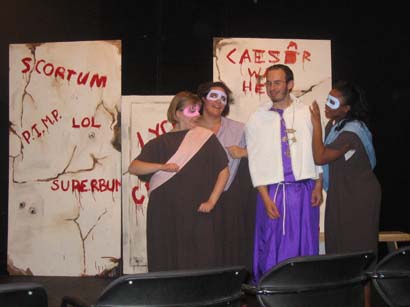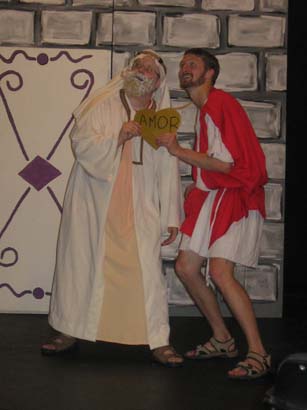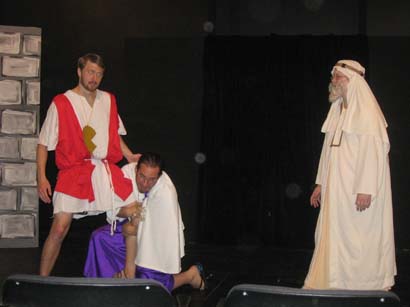 |
|
|---|---|
A Night at the OperaIn the 1935 movie A Night at the Opera, starring the Marx Brothers, a basic romance plot is contrived in order to give an excuse for the Marx Brothers to make jokes and be in funny situations. The opening scene introduces the character of Otis Driftwood (Groucho Marx) and puts him in contrast with the aristocratic opera world and the wealthy Mrs. Claypool (Margaret Dumont). Mr. Driftwood is interested in Mrs. Claypool's money and tries to convince her to marry him. Driftwood's motivations throughout the movie center around acquiring money. This single-minded drive for money is why he initially seeks out 'the greatest tenor in the world,' and makes it part of his mission to bring Ricardo Baroni (Allan Jones) to America and into the New York Opera. In this sense Driftwood is a lot like the Aristophanic comic hero Makemedo, for it is his selfish drive that advances the plot.
Fiorello (Chico Marx) and Tomasso (Harpo Marx) are friends from the beginning, as evidenced by their salami exchange the first time they appear together. Fiorello finds his friend Ricardo backstage at the opera and offers to be his manager, but unlike Groucho, Fiorello will work for free as long as Ricardo feeds him. Ricardo needs a manager so his talent as an operatic tenor can be brought to the attention of those who would hire him. The aristocrats, love between Ricardo and Rosa Castaldi (Kitty Carlisle), and the opera are the central elements of the plot that provide a context in which the Marx brothers can run wild. The boat ride across the Atlantic to New York offers a change of scenery and a fresh group of blocking characters for the Marx brothers and their stowaway friend to use in their comedy. Groucho gives the service people a hard time about everything, making them run around to get him what he needs and cramming every one of them into his tiny room. The boat also gives Fiorello and Tomasso the opportunity to play their music and commune with their countrymen.
The funny situations keep coming as the three stowaways go incognito as the world's greatest aviators to get into the country. More hilarity follows as Groucho attempts to hide the men from the law. They get caught and Groucho gets fired, consequently withdrawing his marriage proposal to Mrs. Claypool. The plot builds to its climax of comedy as Driftwood, Tomasso and Fiorello resolve to exact revenge upon Gottlieb. They sabotage the opera, causing much embarrasment for the lead tenor Rodolfo Lassparri, who has always been arrogant towards Ricardo and was a nuisance to Rosa. The action is high-paced and chaotic during the scene where they are sabotaging the opera. One gag comes right after the other and the laughs are layered on one another as Tomasso and Fiorello do ridiculous things on stage and Driftwood does ridiculous things in the audience. The pandemonium escalates until Tomasso takes Lassparri hostage, forcing Gottlieb to let Ricardo and Rosa take the lead roles for the rest of the show. Thus Ricardo's original goals of being with Rosa and having a job are fulfilled. Through all of his cunning manipulation Driftwood gets his job back working for Gottlieb. Plautus' PoenulusPoenulus follows a pretty standard Plautine plot. It opens with a prologue delivered by the slave Igor (originally called Milphio), which gives the audience an introduction to the sarcastic nature of his character and basic background information on the plot up to the beginning of the play. Igor's master Boris (originally Agorastocles) was born in Baghdad (Carthage) but was kidnapped at an early age and taken to Sarajevo, where he was sold to a "rich old man, who wanted children, and couldn't stand women" (lines 73-74). It just so happens that the rich old man was an old friend of the boy's father but was unaware of this fact. Poenulus differs from most of Plautus' plays in that instead of having only one kidnapped child who is sold far away from home, it has three. Boris has two female cousins who were also kidnapped from Baghdad and then were sold to a pimp who, at the opening of the play, lives next door to Boris. The pimp, called the Wolf in our translation (originally Lycus), intends to make the girls become prostitutes and make money for him. The catch is that Boris has fallen in love with the older of the sisters, Tchotchka (Adelphasium). This follows the less traditional pattern of a free born man falling in love with a lower class slave woman.
Throughout the first part of the play, prior to the entrance of Saddam (Hanno), Igor plays the role of the servus callidus. He is the one who comes up with the plot to frame the Wolf for harboring the slave Blini (Collybiscus). While Boris has fallen into servitude and submission to the strong love that he feels for Tchotchka, Igor has to become his master so to speak, and does his thinking for him. The trickery of Igor successfully frames the pimp. The goal of hooking Boris up with Tchotchka is however not completed until Saddam arrives and plays his tricks and also triggers a chain of recognition scenes. Once Saddam is in the scene, Igor no longer has an important function in achieving Boris' ultimate goal, and thus is not even present on stage for the rest of the play.
Part of what makes the last act of Poenulus so dynamic and action packed is all of the recognition scenes that occur, all leading towards the realization that the two sisters Tchotchka and Katya (Anterastilis) are the daughters of Saddam. First, Saddam enters and discusses with Boris their family history and a recognition occurs when Saddam mentions Vladimir. Boris says that Vladimir is his father and the two of them compare tokens of hospitality to prove that they really are friends. Tokens are often used in recognition scenes to prove the identity of estranged family members or friends. Absurdly, one of the reasons that Saddam knows that Boris really is his family member is a monkey bite on his hand. This physical characteristic actually reveals that Boris is the son of Saddam's brother. These are two recognition scenes that are placed back to back in the action between Boris and Saddam. The next recognition scene is between Saddam and Yasmin (Giddenis). Earlier, Igor has come up with the idea for Saddam to pretend that he is the father of Tchotchka and Katya. Humorously, from Igor's vague description of the girls and their nurse, Saddam recognizes them as the missing members of his household. Thus, a third recognition scene occurs when Yasmin is called outside and immediately recognizes her former master and falls down at his feet. Their meeting is quickly followed by the reunion of Yasmin with her son, one of Saddam's slave boys. Most recognition scenes are between major characters and are very significant to the plot. The reunion of Yasmin and her son is thrown in by Plautus as a mockery of the serious nature of the convention, and has no effect on the main storyline whatsoever. The final recognition scene takes place between Saddam and his daughters, but unlike the others it does not occur as soon as they meet. Saddam decides to trick Tchotchka and Katya at first, imitating the homecoming of Odysseus in which he diguises himself from his wife. This time, Saddam accuses the girls of kidnapping his daughters and threatens to take them to court. Then once Boris tells him it is time, he reveals his identity to them and all rejoice.
With all the recognitions and reunions out of the way, Saddam promises Tchotchka's hand to Boris in marriage, and the Wolf is forced to let the girls go with their father. All ends well, and Saddam, in a spirit of goodwill, forgives the Wolf and decides not to take him to court. Thus all relationships are happily resolved and the marriage preparations can begin.
|
|
For questions or comments, please contact John Gruber-Miller |
|
